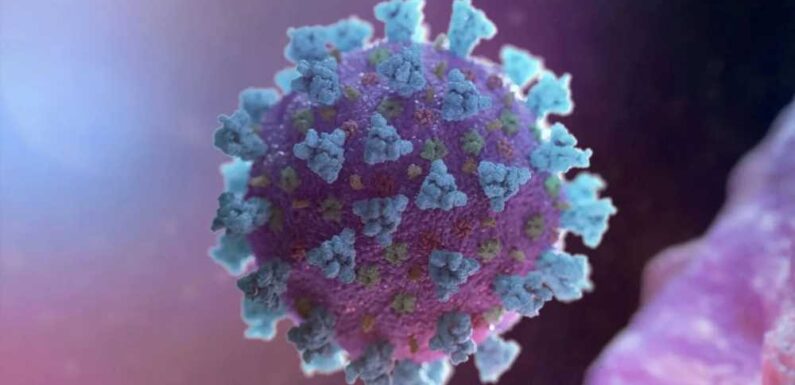
COVID cases have once again crept up in the UK, with a new variant dubbed Eris – after the Greek goddess of discord and strife – gaining dominance.
With hospital admission numbers also being nudged upwards, experts have speculated that the so-called 'Barbenheimer effect' could be behind them.
The concurrent release of Barbie and Oppenheimer two weekends ago pushed Brits to the cinema in droves.
The social media frenzy around the cinematic event of the year had experts speculating that Covid infections could rise as the films opened to the public on July 21.
In the US, Dr Peter Hotez, dean of the National School of Tropical Medicine, tweeted: "Not to be a Debbie Downer…but anyone worried about a post-Barbie Box Office Covid bump? Or post-Oppie?"
Speaking to MailOnline, virologist at Warwick University Professor Lawrence Young said theory had some credence.
Read more on summer health
Gross habit millions of Brits have could increase risk of catching Covid
Holiday warning as mosquitoes carrying killer virus becoming IMMUNE to bug spray
With the UK Health Security Agency (UKHSA) estimating that Covid infections rose by 5.4 per cent in the week leading up to July 31, he told the paper that 'increased cinema attendance' and 'more indoor mixing' due to bad weather may have contributed.
But he emphasised that there was 'no evidence' that the new Eris variant – which now makes up one in seven UK cases -is more dangerous or causes more severe disease.
Dr Young explained: "The rise in cases in the UK is probably due to waning protective immunity — it's some time since people received their last booster jabs and/or were previously infected — and to increased mixing in enclosed, poorly ventilated spaces.
"Poor weather over the last month has meant more indoor mixing including during various events such as university degree congregations and increased cinema attendance."
Most read in Health
Mum issues warning after baby left fighting for life with little-known bug
Guzzling fizzy drinks and cakes increases risk of painful health condition
From sweet potatoes to sardines… 8 foods that can add years to your life
Mum, 31, dies after catching brain-swelling bug during boob job surgery
While cases numbers are far below the peaks seen over the winter, he said the fact that they're rising should nonetheless cat as a 'wake-up call' that it possible to put the pandemic totally behind us just yet.
He stressed the need of not being 'complacent' and to monitor new variants ahead of an 'inevitable' rise in cases this autumn and winter.
Some 4,396 were reported to the UKHSA through the Respiratory DataMart System in the week leading up to July 31.
This was a sharper rise compared to the week previous, when cases rose by 3.7 per cent to 4,403.
Hospital admissions due to Covid also increased in that same week among all age groups, the health watchdog added in its most recent report.
People aged 85 and over continue to have the highest hospital admission rates, it added.
Dr Mary Ramsay, Head of Immunisation at the UK Health Security Agency (UKHSA), said: “We continue to see a rise in COVID-19 cases in this week’s report. We have also seen a small rise in hospital admission rates in most age groups, particularly among the elderly.
"Overall levels of admission still remain extremely low and we are not currently seeing a similar increase in ICU admissions. We will continue to monitor these rates closely."
She had a few pieces of advice on how to continue to stay safe: “Regular and thorough hand washing helps protect you from COVID-19 and other bugs and viruses."
And it's still important to limit your social contact with others if you think you have Covid, she added.
It comes as the NHS is prepping for yet another booster jab roll out this coming autumn.
Dr Ramsay said: "The NHS will be in contact in autumn 2023 when the seasonal vaccine is available for those who are eligible due to health conditions or age, and we urge everyone who is offered to take up the vaccine when offered.”
As for the new variant taking hold of the UK, scientifically known as EG.5.1, experts say it's too early say how it will affect the nation.
But UKHSA chiefs claim the variant already has a 20.5 per cent growth advantage on other strains.
Data also suggests it accounts for 14.6 per cent of cases, making it the second most prevalent in the UK.
Read More on The Sun
Asda makes a major change to stores with new shopping range
I was a single mum on benefits – I now own a giant home & earn £100k
Arcturus – an offshoot of Omicron – still remains the most dominant variant.
What are the symptoms of Covid-19?
Covid-19 symptoms can include:
- a high temperature or shivering (chills) – a high temperature means you feel hot to touch on your chest or back (you do not need to measure your temperature)
- a new, continuous cough – this means coughing a lot for more than an hour, or 3 or more coughing episodes in 24 hours
- a loss or change to your sense of smell or taste
- shortness of breath
- feeling tired or exhausted
- an aching body
- a headache
- a sore throat
- a blocked or runny nose
- loss of appetite
- diarrhoea
- feeling sick or being sick
Source: NHS
Source: Read Full Article










